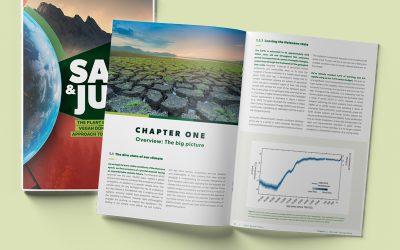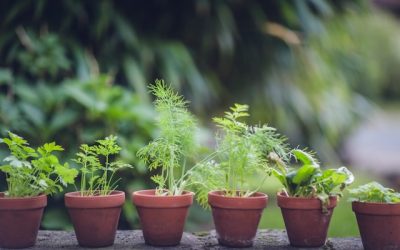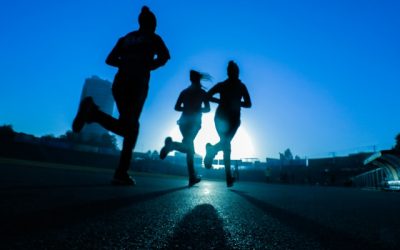Blog
Greta Thunberg tweeted the world’s 4th most popular tweet in late 2022 when she exposed Andrew Tate’s male toxicity; a combination of misogyny and wanton consumption. Tate taunted Greta about his 33 cars and their “enormous emissions”. “Please provide your email address so I can send a complete list of my car collection and their respective enormous emissions,” Tate tweeted. But the coming-of-age 19-year-old climate activist and feminist couldn’t care less. “Yes, please do enlighten me. Email me at [email protected],” she responded, taking Tate’s self-aggrandizing post more than a few notches down.
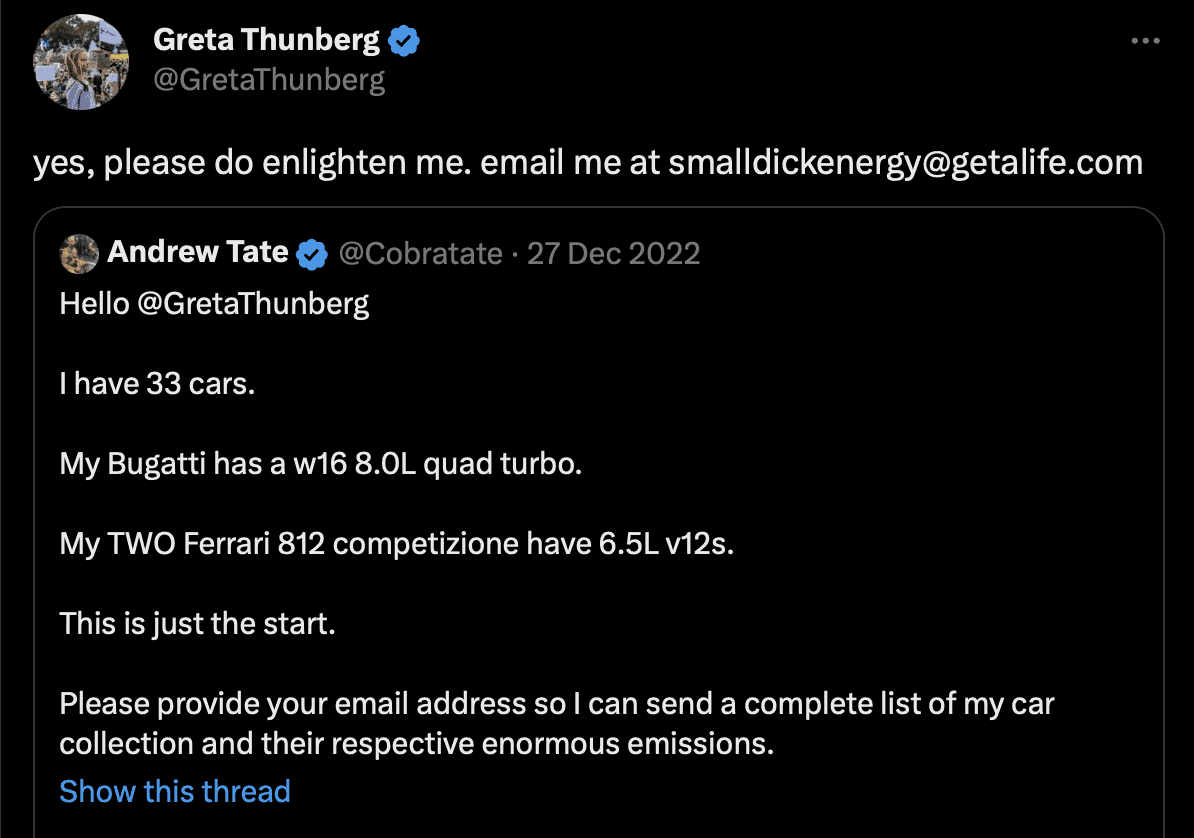
Source: Twitter
Greta just published a pioneering and comprehensive textbook on the climate emergency and climate solutions called The Climate Book. In it she writes: “…as much as I hate to admit it – Beyoncé was wrong. It is not girls who run the world. It is run by politicians, corporations and financial interests – mainly represented by white, privileged, middle-aged, straight cis men. And it turns out most of them are terribly ill suited for the job.” They prioritize profit above saving the world.
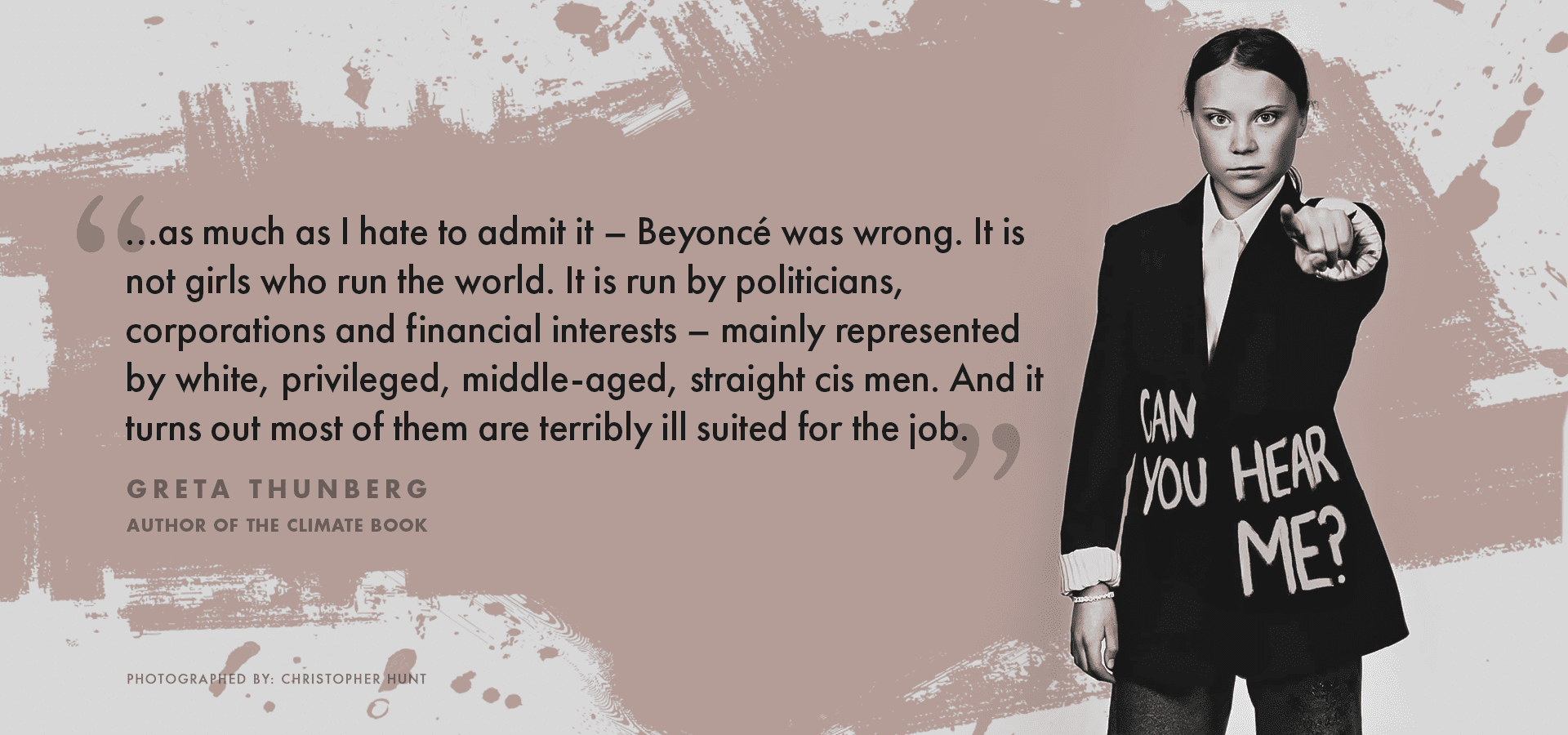
The Climate Book offers grist for saving the planet by transitioning to a plant based food system. It relates to the Plant Based Treaty’s 3R principles with its references to the commodification of animals and nature, the need for a just transition with the polluter pays principle, and restoration of ecosystems and forests.
In chapter 5.17 of The Climate Book, Fridays for Future Argentina’s activist Nicki Becker writes: “The first time I marched, it was International Women’s Day. I was fourteen years old and I had just discovered that women did not have the same rights as men… On my fifth march, in the middle of the crowd I came across a sign that read, “Neither Land nor Women are Territories of Conquest.” … A week later, together with a group of other young people, we organized the first climate strike in Argentina.”
You can view the climate crisis as a symptom of a larger problem. Animal agriculture is one of the driving forces of patriarchy and climate change; the root cause of the climate crisis being how we view our relationship with other animals, nature, and each other. Some of the main elements of animal exploitation rests on considering women, nonhuman animals and nature to be a resource and the idea of controlling reproduction as Carol Adams pointed out in her groundbreaking book The Sexual Politics of Meat. Female (and male) reproduction systems are ruthlessly exploited so someone can profit.
We need to challenge patriarchal notions of female reproduction. This week I was interviewed alongside pattrice jones by Lena and Jo from the Polish Green REV Institute team – the European Vegan Summit (EVS) and the European Fem Institute respectively. pattrice asked, “How does homophobia lead to climate change?” It’s linked to this idea that heterosexual partnering leading to children is the pinnacle to adulthood and what is normal, says pattrice. This leads to more consumers buying more things and producing more climate change. The book, Queer Ecologies, calls this “reprocentricism.”
pattrice jones learned from Black feminism’s intersectionality the problems of systematic discrimination across multiple patriarchies and forms of oppression. Eco-feminism needs to explore the problems faced by women and girls ecologically as well as the ways oppression is related to other structural violence such as the exploitation of animals and the natural world and the ways humans hurt each other, she says. The linkages between racism and sexism need to be addressed: “You can’t solve one set of problems without reference to the other,” pattrice warns. “If feminism simply focuses on improving the status of girls and women but does not challenge racism and class oppression you run the risk of bringing women in but not worrying about anyone else. This can lead to substantial mis-behavior on the part of women if they are only attending to the way they are disadvantaged and not attending to how they are privileged. If we are not aware of our own positions then we can accidentally do harm.”
The 2023 theme of the UN’s International Women’s Day is #EmbraceEquity – the “E” in DEI… Diversity, Equity and Inclusion. Women and girls are on the frontlines of climate change, particularly in the Global South, which is most vulnerable to harmful pollution caused mainly by the US, Canada, and Europe’s wealthier nations. For example, water shortages induced by the climate crisis will disproportionately affect women and girls, who will have to walk further to obtain water, exacerbating existing gender inequalities.
Greta tells us, “We are currently on track to have a world that is 3.2C hotter by the end of the century – and that’s if countries fulfill all the policies they have in place, policies that are often based on flawed and under-reported numbers…. We are approaching a precipice. And I would strongly suggest that those of us who have not yet been greenwashed out of our senses stand our ground. Do not let them drag us another inch closer to the edge. Not one inch. Right here, right now, is where we draw the line.”
The solutions to the climate crisis lie in organizing, activism and systems change. The Climate Book includes a chapter by Naomi Klein who was historically blind to the impact of animal agriculture on a just transition including the Polluter Pays Principle. There’s also an important chapter on restoring and rewilding land by Nobel laureate Wangari Mathei who started the Green Belt Movement in Kenya sharing seedlings and planting trees including mango and other fruit trees.
“Think globally, act locally” was a popular slogan when the UN adopted International Women’s Day five decades ago. We need this more than ever.
What you can do to “Think globally, act locally”:
➡ Read Greta Thunberg’s The Climate Book
➡ Join Greta: Go vegan, don’t fly and buy second-hand clothes. In The Climate Book, Greta understands that as one person her emissions won’t necessarily make the difference. But she, like Tolstoy and Gandhi before her, believes it’s important to act as a role model. By taking individual action you are showing that you believe there is a climate emergency. Also these individual changes help lead to systems change.
➡ Demand institutional change: Lobbying cities and their institutions including schools, care homes, hospitals, prisons and workplaces to introduce plant-based menus and plant-based defaults can significantly increase the consumption of healthy plant-based foods. Explore our PBT 1.5 Playbooks and find a variety of lobbying resources and tools designed to help institutions make the switch to sustainable practices.
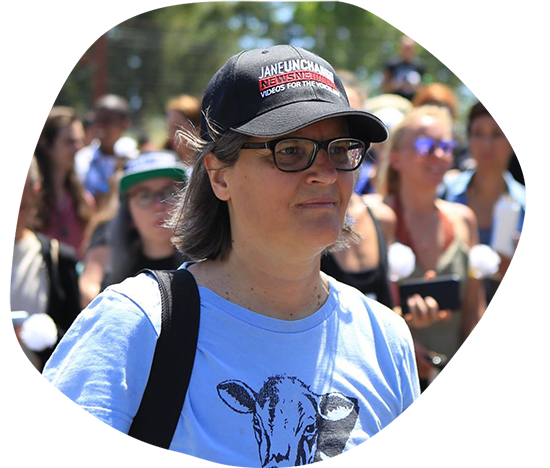
Anita Krajnc is the co-founder of Toronto Pig Save and the Executive Director of the Animal Save Movement, a worldwide network of Save groups bearing witness to farmed animals and promoting veganism and love-based, grassroots activism. Anita helps coordinate global campaigns such as the Plant Based Treaty.
More from the blog
6 Important Calls To Action From The Safe And Just Report – Part One
By Miriam Porter
Grow Your Own Kale And Spinach For Healthy Green Smoothies
By Miriam Porter
The Importance Of Exercise And Tips On Building Muscle
By Miriam Porter

